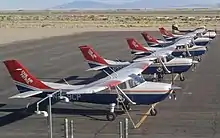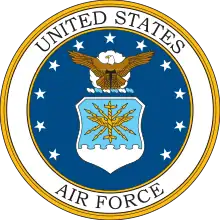Utah Wing Civil Air Patrol
The Utah Wing of the Civil Air Patrol (CAP) is the highest echelon of Civil Air Patrol in the state of Utah. Utah Wing headquarters are located in Salt Lake City, Utah.[2] The Utah Wing consists of over 750 cadet and adult members in 14 locations across the state of Utah.[3]

 Utah Wing of Civil Air Patrol | |
| Associated branches | |
|---|---|
| United States Air Force | |
| Command staff | |
| Commander | |
| Vice Commander | |
| Chief of Staff | |
| Current statistics | |
| Squadrons | 14 |
| Cadets | 433 |
| Seniors | 320 |
| Total Membership | 753 |
| Statistics as of 24 December 2019[1] | |
Mission
The Utah Wing has six primary missions of the Civil Air Patrol for both Civil Air Patrol members and the general public: Emergency Services, Cadet Programs, and Aerospace Education.[4]
Counter-drug
CAP joined the War on Drugs in 1986 when, according to congressional authorization, it signed an agreement with the U.S. Air Force and U.S. Customs Service allowing CAP resources to help stem the flow of drugs into and throughout the United States.[5]
Cadet programs
Thousands of young people are introduced to aviation through CAP's cadet program. The program allows young people to progress through a 16-step program including aerospace, education, leadership training, physical fitness, and moral leadership. Cadets compete for academic scholarships to further their studies in fields such as engineering, science, aircraft mechanics, aerospace medicine, meteorology, as well as many others. Cadets who earn cadet officer status may enter the Air Force as an E3 (airman first class) rather than an E1 (airman basic).
In support of cadet training, the Utah Wing conducts a cadet basic encampment[6] semiannually. Encampment is the initial special cadet activity that serves as a gateway for other advanced special activities. Cadet camping provides a basic introduction to CAP cadet programs and focuses on the development of self-reliance, teamwork, and leadership. Instruction topics include the history and customs of the U.S. Air Force, how to live the CAP Core Values, and career exploration in aviation and STEM careers. The 2020 summer encampment series was named Desert Hawk XVIII and the encampment has been held at Wendover Airfield, Utah, for over a decade. The winter encampment series in 2019 was known as Southern Arch III and was held in Mesquite, Nevada, from December 26-31, 2019.

Each year, cadets have the opportunity to participate in special activities at the local, state, regional, or national level. Many cadets have the opportunity to solo fly in an airplane for the first time through a flight camping or academy, while others travel abroad through the International Air Cadet Exchange Program. Cadets also assist at major air shows throughout the United States.[7]
Aerospace education
CAP's aerospace education efforts focus on two different audiences: volunteer CAP members and the general public. The programs ensure that all CAP members (seniors and cadets) have an appreciation for and knowledge of aerospace issues. Members are required to participate in the educational program to advance within the organization. Aerospace educators at CAP's National Headquarters at Maxwell Air Force Base in Alabama provide current materials that reflect the highest standards of educational excellence.
In addition to internal aerospace education, the CAP's external aerospace programs are conducted through the national educational system. Each year, the CAP sponsors many workshops in states across the nation, reaching hundreds of educators and thereby thousands of young people. These workshops highlight basic aerospace knowledge and focus on advances in aerospace technology. CAP's aerospace education members receive more than 20 free aerospace education classroom materials.[8]
The internal aerospace education program is divided into cadet and senior programs. Cadets complete aerospace education as one of the requirements to progress through the achievement levels of the cadet program, while Senior members have a responsibility to become knowledgeable of aerospace issues and the aerospace education program that CAP provides. They are further encouraged to share the information obtained with their local communities and school systems.
Organization
| Designation | Squadron Name | Location | Notes |
|---|---|---|---|
| UT-007 | Salt Lake City Senior Squadron | Salt Lake City | |
| UT-017 | Castle Valley Composite Squadron | Price | |
| UT-024 | St George Composite Squadron | Saint George | |
| UT-027 | Weber Minuteman Composite Squadron | Layton | |
| UT-048 | Phoenix Cadet Squadron | Taylorsville | |
| UT-049 | Cache Valley Composite Squadron | Logan | |
| UT-053 | Sevier Valley Cadet Squadron | Richfield | |
| UT-067 | Thunderbird Cadet Squadron | Salt Lake City | |
| UT-069 | Cedar Mustangs Composite Squadron | Cedar City | |
| UT-080 | Blackhawk Cadet Squadron | Draper | |
| UT-083 | Phantom Composite Squadron | Provo | |
| UT-088 | 88th Composite Squadron | Sandy | |
| UT-117 | Uintah Wilderness Cadet Squadron | Vernal | |
| UT-801 | UMA Cadet Squadron | Riverdale | |
See also
References
- "eServices, National Headquarters". Civil Air Patrol., login required
- "Utah Wing > Contact Us". Utah Wing Civil Air Patrol Official Website. Retrieved 3 December 2015.
- "2014 Statistics" (PDF). Capmembers.com. Retrieved 3 December 2015.
- "Civil Air Patrol". Civil Air Patrol Official Website. Retrieved 3 December 2015.
- "Emergency Services". Civil Air Patrol Official Website. Archived from the original on 9 November 2015. Retrieved 1 July 2017.
- "Encampment". Civil Air Patrol Official Website. Retrieved 28 December 2019.
- "Cadet Programs". Civil Air Patrol Official Website. Archived from the original on 3 December 2015. Retrieved 1 July 2017.
- "Aerospace Education". Civil Air Patrol Official Website. Archived from the original on 14 November 2015. Retrieved 1 July 2017.
- "Utah Squadrons". Utah Wing Civil Air Patrol Official Website. Retrieved 22 July 2017.
- "Civil Air Patrol Unit Directory" (PDF). Gocivilairpatrol.com. Archived from the original (PDF) on 7 August 2015. Retrieved 3 December 2015.
